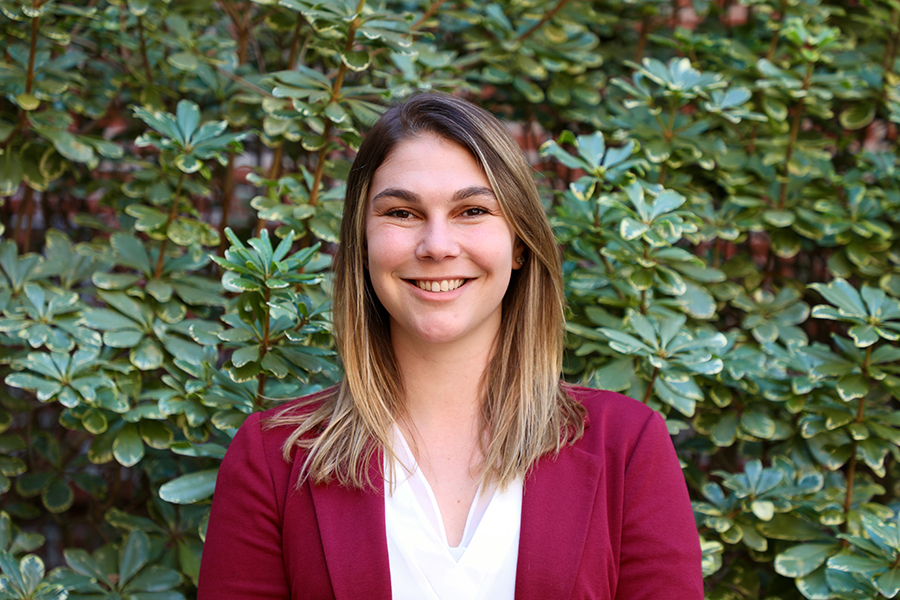Student Spotlight: Danielle Morabito

Danielle Morabito is a doctoral student pursuing a clinical psychology degree through Florida State University’s Department of Psychology, part of the College of Arts and Sciences. In 2015, she received her bachelor’s degree in psychology and criminology from the University of Miami. After graduating, Morabito worked for the U.S. Department of Veterans Affairs National Center for PTSD for three years as a post-baccalaureate research coordinator and health science specialist before starting her doctoral track at FSU.
What year are you in school, and when do you expect to graduate?
I am a fourth-year doctoral student. I have at least two years left, but I recently applied for a research grant that would extend my stay for an extra year. So, I plan to graduate either August 2024 or August 2025.
Tell us a little about your background, where you’re from and what brought you to FSU.
I grew up in a small town in New Jersey, and I really wanted to get out and do something more. So, I ended up going to the University of Miami to pursue a degree in psychology and criminology. After graduation, I went to work for the National Center for PTSD in Palo Alto, Calif., for three years, and while I was there, I applied to doctoral programs that I knew could prepare me for a future in clinical psychology. In terms of fit and resources available, FSU was the best choice for me.
What inspired you to pursue a degree in clinical psychology?
When I started undergrad, I thought I wanted to be involved in something law enforcement related like criminal profiling. But as I started taking psychology courses, I became really passionate about clinical psychology and the victim side of crime. Getting involved in research was also a large part of why I decided to pursue a doctorate in clinical psychology. I was always drawn to working with anxiety and trauma-related disorders, and I find that asking scientific questions about human behavior is absolutely fascinating.
Tell us about your work with FSU’s Anxiety and Behavioral Health Clinic.
My research broadly falls within the areas of anxiety and trauma-related disorders, and I’m currently focusing on threat responses, particularly the freeze response. Everyone has heard of fight or flight, but not everyone is as familiar with the freeze response. Sometimes people who experience a prolonged freeze response, or what we call tonic immobility, feel guilty or ashamed of responding passively to a trauma. We see a lot of this in sexual assault research. For example, if someone freezes, and they feel like they can't escape the situation, they lose the ability to move or cry out, and sometimes they even dissociate or remove themselves from the situation. It's a natural way of protecting ourselves, but the guilt people sometimes feel about it can lead to increased trauma-related symptoms.
Research shows that people who experience tonic immobility, or freeze response, during a traumatic event are actually potentially treatment resistant. There's only been a couple studies on this so far, but we are observing that those people are not recovering in the same way as people who didn't experience a freeze response.
What do you want the public to know about your research? Why are your topics important?
I am passionate about research in trauma, and specifically my recent research in threat responding, because it can help us understand the individual differences between those who recover from a trauma and those who go on to have many debilitating trauma-related symptoms. We know that somewhere between 60 and 90 percent of the population experience trauma, and only 4-8 percent are estimated to go on and develop PTSD, which can have a huge impact on people's lives. And so, we want to know what it is about that 4-8 percent and how we can intervene, prevent and help people recover.
What are some current goals or projects that you’re working on?
I’m currently working on a couple collaborations with other labs. The first, which is in collaboration with the University of Houston’s Trauma and Stress Studies Center, is looking at data on firefighters’ lifetime experiences and occupational stress. We’ll be analyzing factors like stress on the job and demographic factors to see how those things predict posttraumatic stress symptoms, and I'll be submitting those findings for a presentation soon.
The second collaboration is with FSU professor of psychology and social psychology area director Jon Maner’s lab, and we will be looking at how unpredictability in childhood might influence PTSD.
What on-campus resources have helped you achieve success?
Office of Graduate Fellowships and Awards has been absolutely vital in terms of finding funding to further my work and to run some of the studies I'm hoping to conduct in community populations.
The FSU Office of Research and its Collaborative Collision events have been great for networking and professional development. There are a lot of people here at FSU who are super collaborative and helpful if you need anything in terms of training.
Are there any faculty or staff who have helped or inspired you?
My mentor, distinguished research professor and director of the Anxiety and Behavioral Health Clinic, Brad Schmidt has definitely helped and inspired me a lot.
Following your graduation, what are your plans? Even though you might miss FSU, what are you looking forward to once you graduate?
Running my own research lab as a tenure track psychology professor is my number one goal. I’d also love to mentor students at varying stages of their degrees. Also, given my history working with Veterans Affairs, I would be interested in working for or collaborating with the VA in a research role as well.
